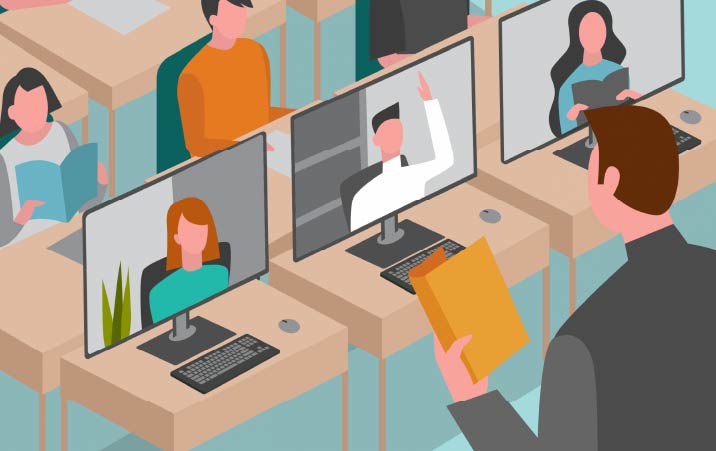I started my first day as a teacher last August, staring at seven little 4-year-olds who stared back at me through a quiet Zoom screen. I pressed unmute, animatedly introduced myself, and invited them to do the same, as they sunk into their parent’s lap or squirmed in an oversized chair in their living room. We sang “Old McDonald” with each voice cutting in and out on top of each other. I pressed Mute All to read Jacqueline Wilson’s The Day You Begin, and their eyes glanced at the illustrations before grabbing the nearest toy. Then, 30 minutes after we started, we waved goodbye, and I sat in the screeching silence of my apartment in Oakland, Calif., wondering, what next?
I began teaching transitional kindergarten in a large, public school district in the Bay Area, at a small, Title I, predominantly Black P-5 school. As a Black female teacher myself, I was aware of how relevant these demographic details were during the pandemic. Remote learning hit low-income communities of color particularly hard, thanks to a mix of limited funding, barriers to connectivity, and the disproportionate toll of COVID-19 on Black and Latinx families.
Of the many upheavals caused by the pandemic, the disruption to K-12 learning has been one of the most severe. First-year teachers like me were thrown into the crisis, beginning our teaching careers in the middle of a pandemic.
So, when the school year started last fall, I expected the worst. Remote learning brought a range of challenges, the easiest of which included frantically dropping off devices, getting kicked out of Zoom meetings, and ending the school days in tears (for me, but for students, too). And yet, there has also been lots of joy, laughter, and growth. My class has written our own books, conducted science experiments, recorded dance performances, and done our best to fill our virtual space with all the positivity we can muster. I have heard my fellow teachers (many of them also in their first year of teaching) express similar surprise that we could still have fun in school, even under the circumstances.
This year was nothing like I had imagined, but a few weeks before the end of the year, I am excited about my future in the field. The pandemic revealed and exacerbated the strains and responsibilities put on teachers. At the same time, this challenging year has created new possibilities for what it could mean to be a teacher in a post-COVID-19 world.
Last spring, professor and activist Bettina Love wrote in Education Week: “We cannot go back. We now have the opportunity not to just reimagine schooling or try to reform injustice but to start over.” For first-year teachers like myself, this call to action comes with another layer of complexity: How do we start over at the start of our career? What will we view as the role and responsibility of teachers and schools? How might the pandemic influence my generation of teachers and the subsequent generations of students?
As I prepared last summer for my first school year, I virtually attended panels, discussions, and talks held all over the country with hundreds and thousands of other teachers. I watched as they shared their remote learning experiences so far, vented about their continued frustrations, and organized with their unions for what students and teachers need and deserve. When the school year began, my principal and new colleagues (who had never met me in person) sent encouraging texts, shared advice in phone calls, and cheered me on in Zoom meetings. They anticipated my professional loneliness and let me know that I was not alone. Though it wasn’t happening in the teachers’ lounge like I had imagined, I was still able to start my career by looking to other teachers for inspiration, comfort, and political action. The pandemic reminded me how important solidarity is among teacher colleagues, especially when even the most experienced teachers were suddenly forced to become first-year teachers again because of remote learning.
Teaching through this crisis also pushed me to closely communicate and collaborate with parents more than I might otherwise have done in a normal first year. Like many other teachers across grade levels, I was prepared for the traditional (and often harmful) expectation that parents leave their kids at school and hear minimal updates beyond parent-teacher conferences and misconduct. For years, many families—and particularly families of color—have felt shut out of their children’s education, blocked by mistrust, bureaucracy, and language barriers.
This year, however, schools were forced to bring families into the classroom, in what one of my classroom parents described as a “co-teacher” dynamic. I relied on the adults at home to facilitate and often directly support instruction. I found that working together with parents created a mutual respect and appreciation of the hard work of teaching—and parenting.
Finally, educators have spent the year wrestling with the challenge of keeping kids online and engaged at the same time, for hours at a time. This has proved to be no easy feat for high school educators teaching to a box of squares belonging to Zoom-fatigued teenagers or early-childhood educators trying to wrangle the youngest students away from their favorite toys (or any nearby object). In many cases, often unintentionally, fun has become a—if not the—priority in the classroom. Many of us have made time for more games, music, and levity to create moments of joy in a difficult year.
